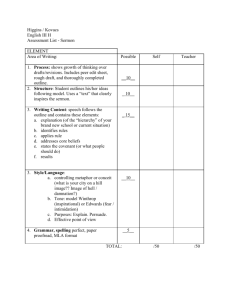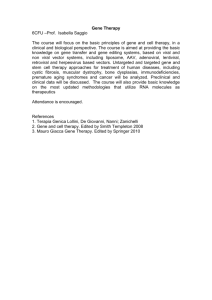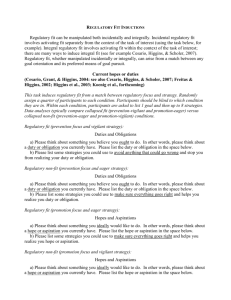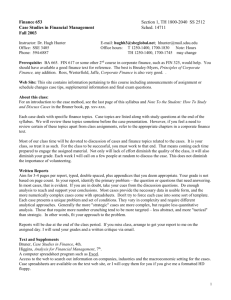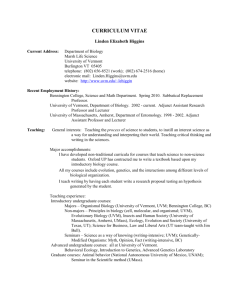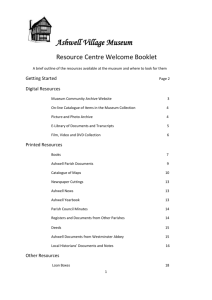Report on Program
advertisement
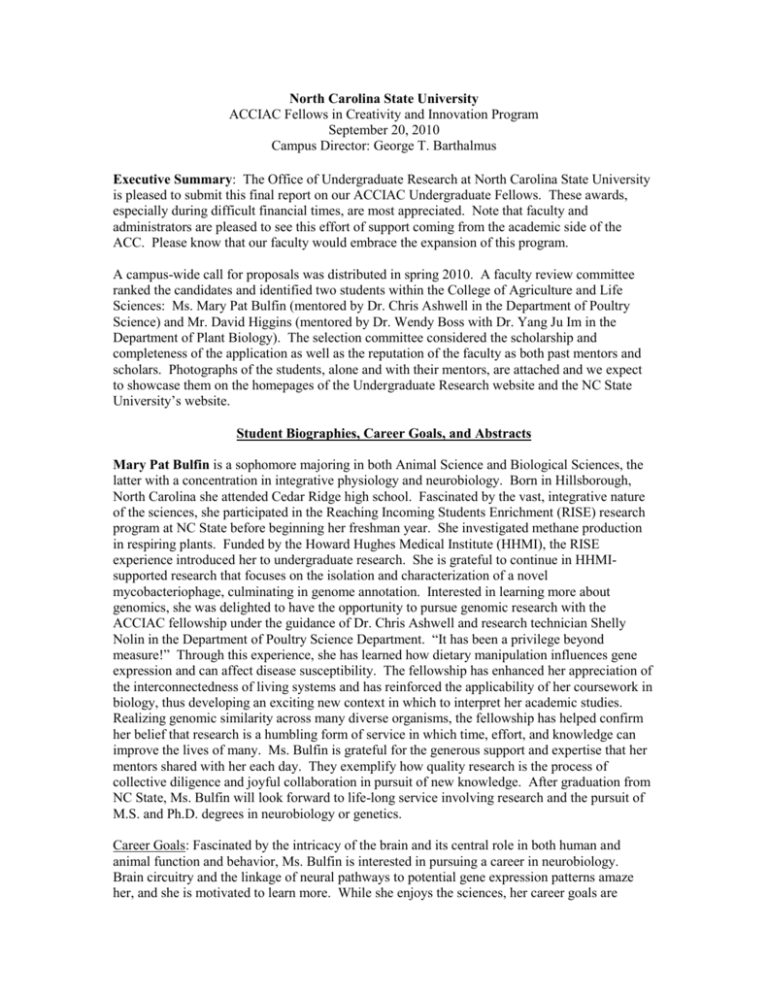
North Carolina State University ACCIAC Fellows in Creativity and Innovation Program September 20, 2010 Campus Director: George T. Barthalmus Executive Summary: The Office of Undergraduate Research at North Carolina State University is pleased to submit this final report on our ACCIAC Undergraduate Fellows. These awards, especially during difficult financial times, are most appreciated. Note that faculty and administrators are pleased to see this effort of support coming from the academic side of the ACC. Please know that our faculty would embrace the expansion of this program. A campus-wide call for proposals was distributed in spring 2010. A faculty review committee ranked the candidates and identified two students within the College of Agriculture and Life Sciences: Ms. Mary Pat Bulfin (mentored by Dr. Chris Ashwell in the Department of Poultry Science) and Mr. David Higgins (mentored by Dr. Wendy Boss with Dr. Yang Ju Im in the Department of Plant Biology). The selection committee considered the scholarship and completeness of the application as well as the reputation of the faculty as both past mentors and scholars. Photographs of the students, alone and with their mentors, are attached and we expect to showcase them on the homepages of the Undergraduate Research website and the NC State University’s website. Student Biographies, Career Goals, and Abstracts Mary Pat Bulfin is a sophomore majoring in both Animal Science and Biological Sciences, the latter with a concentration in integrative physiology and neurobiology. Born in Hillsborough, North Carolina she attended Cedar Ridge high school. Fascinated by the vast, integrative nature of the sciences, she participated in the Reaching Incoming Students Enrichment (RISE) research program at NC State before beginning her freshman year. She investigated methane production in respiring plants. Funded by the Howard Hughes Medical Institute (HHMI), the RISE experience introduced her to undergraduate research. She is grateful to continue in HHMIsupported research that focuses on the isolation and characterization of a novel mycobacteriophage, culminating in genome annotation. Interested in learning more about genomics, she was delighted to have the opportunity to pursue genomic research with the ACCIAC fellowship under the guidance of Dr. Chris Ashwell and research technician Shelly Nolin in the Department of Poultry Science Department. “It has been a privilege beyond measure!” Through this experience, she has learned how dietary manipulation influences gene expression and can affect disease susceptibility. The fellowship has enhanced her appreciation of the interconnectedness of living systems and has reinforced the applicability of her coursework in biology, thus developing an exciting new context in which to interpret her academic studies. Realizing genomic similarity across many diverse organisms, the fellowship has helped confirm her belief that research is a humbling form of service in which time, effort, and knowledge can improve the lives of many. Ms. Bulfin is grateful for the generous support and expertise that her mentors shared with her each day. They exemplify how quality research is the process of collective diligence and joyful collaboration in pursuit of new knowledge. After graduation from NC State, Ms. Bulfin will look forward to life-long service involving research and the pursuit of M.S. and Ph.D. degrees in neurobiology or genetics. Career Goals: Fascinated by the intricacy of the brain and its central role in both human and animal function and behavior, Ms. Bulfin is interested in pursuing a career in neurobiology. Brain circuitry and the linkage of neural pathways to potential gene expression patterns amaze her, and she is motivated to learn more. While she enjoys the sciences, her career goals are ultimately dictated by the desire to serve people in a meaningful way with both her mind and heart through relationships and collaboration. As a hobby, she is intrigued by the remarkable capacity of the canine-human bond to surmount challenges and empower others as demonstrated by search and rescue (SAR) and guide and assistance dog partnerships, and she is excited to serve in such a partnership in the future. Abstract: Effect of exogenous enzyme and DFM supplementation on growth and disease vulnerability in broiler chickens based on ileal IL-10, and IFN-γ RNA expression patterns. Due to rising feed costs and the growing global demand for meat products, commercial poultry producers are challenged to identify methods for raising healthy birds resistant to illness, especially Clostridium-related infection, through dietary manipulation. Two common approaches that consider both financial pressures and biological metabolism are exogenous protease supplementation and supplementation of a direct-fed microbial. Utilizing focused microarray analysis and real-time PCR quantification of interleukin (IL)-10 and interferongamma (INF-γ) mRNA expression patterns in broiler chickens, we observed the contrasting effects on ileal gene expression between control birds (T2) and those given supplemental exogenous dietary enzymes (T4 and T5) and/or a DFM (Avicorr) (T8) in the presence of C. perfringens (CP) disease challenge. We hypothesized that protease supplementation would result in decreased body weight and protease supplementation would negatively impact immunity and inflammation response, and a direct-fed microbial (DFM) would have positive effects. Our results supported our hypotheses, and body weights of the birds followed the following pattern T2 < T4 < T5 < T8 with higher body weight achieved with the DFM. The lesion scores detected in the intestine followed the following pattern T4 > T2 > T5 = T8 across the treatment groups. Relative gene expression of IFN-γ was statistically different between T2 and T8, while relative IFN-gamma gene expression was not statistically different between T4 and T8. Relative gene expression of IL-10 was overall higher across all treatment groups than IFN-gamma. Using a mixed-model ANOVA, 8 differentially expressed genes in addition to IL-10 and IFN-γ were identified. MetaCore pathway analysis of the significant genes identified many known processes involved in signal transduction, carbohydrate metabolism, and cell death. We can deduce that protease enzyme supplementation increases body weight. The negative inflammatory and immunological effect increases with multiple enzymes, and the severity of negative effects is lessened by a supplemental DFM. _________ David Higgins is a junior hoping to major in both the new undergraduate Genetics degree and in Plant Biology with a minor in Biotechnology. He is a member of the University Honors Program and the College of Agriculture and Life Sciences’ Honors Program. Mr. Higgins attended high school in Winston-Salem, NC at West Forsyth High School. There he found interest in science by attending the University of NC system-sponsored Summer Ventures in Science and Mathematics program at Western Carolina University. His first college research was conducted through an NSF REU program at the Donald Danforth Plant Science Center in St. Louis, Missouri, one of the top independent plant research centers in the world, where he studied the biofuel potential of locally collected algae strains. He used that experience to formulate a project with his mentor, Dr. Wendy Boss. That research was based on material learned through taking her Plant Physiology course. The fellowship provided Mr. Higgins with an opportunity to expand his learning beyond the classroom. He discovered that laboratory research is much more than putting together facts learned in class, but also requires an understanding of techniques, concepts, and the complexities of living systems as a whole. Career Goals: Mr. Higgins plans to attend graduate school and pursue a MS and/or a PhD in Plant Cell Biology or Genetics. Then, his plan includes a career in biological research at a university. He hopes to study fields with high-impact implications in helping society while imparting his love of biology to future students. Abstract: Optimizing the transformation of Arabidopsis thaliana with Tap-tagged Phosphatidylinositol phosphate kinase. The phosphoinositide (PI) pathway is involved in sensing changes in gravity, osmotic stress, and light-mediated signaling in plants. The nature of the regulation of the pathway is currently unknown, but is hypothesized to involve the binding of proteins to the key enzyme phosphatidylinositol 4 phosphate 5-kinase (PIPK). To test this hypothesis, I have been attempting to generate plant cells expressing tandem affinity purification (TAP)-tagged forms of the PIPK in order to recover interacting proteins for further analysis. Three approaches were used to achieve this goal: vector-mediated transformation of Arabidopsis cell liquid cultures through co-cultivation with the bacterium, Agrobacterium tumefaciens; a similar method involving callus growth of co-cultivated cell cultures; and a floral dip method involving the submersion of whole Arabidopsis flowers into a solution of A. tumefaciens. Conditions were optimized for the liquid culture transformation; however, this potentially rapid transformation method has yet to yield transformants. Callus growth experiments have produced putative transformed calli and the plants used in the floral dip procedure have begun producing seeds. In the future, I will check for the presence of the TAP-tag mRNA and tagged protein. Once the presence of the protein is confirmed, I will purify the TAP-tagged PIPK and optimize conditions for the recovery of interacting proteins. _______ Emailed attachment: The first attachment is the above 2.5 page document. The required brief executive summary is at the top of page one. A biography for each student participant with her/his completed research abstract follows the summary. The second attachment is of Ms. Mary Pat Bulfin (ACCIAC Fellow) with her mentor, Dr. Chris Ashwell in the mentor's laboratory in the Department of Poultry Science. The third attachment is of mentor Dr. Wendy Boss (left) with Mr. David Higgins (ACCIAC Fellow), and Dr. Yang Ju Im (postdoc and assisting mentor) in the Plant Biology Laboratory at the NCSU Centennial Campus. The fourth is the detailed manuscript of Ms. Mary Pat Bulfin. The fifth is the detailed manuscript of Mr. David Higgins.




